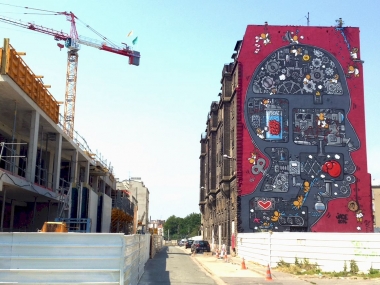More than 400 cities across Europe declaring interest! First insights in the 1st call
Edited on
21 June 2019Shortly after being approved in December 2014, the URBACT III programme launched the 1st call for the creation of 20 action-planning networks. The aim: support European cities with the design of sustainable and integrated urban strategies and action plans. In the framework of this call, 99 network proposals were submitted, involving more than 400 cities across Europe. This is a clear sign that the demand is strong at local level: cities are looking for opportunities to share experiences, find solutions and build up capacities to address the complex challenges they face today.

What is on EU cities’ agenda today?
Under this first call for URBACT III, cities were invited to submit network proposals on 10 of the 11 thematic objectives of the ERDF regulations:
- Strengthening research, technological development and innovation (TO1)
- Enhancing access to and use and quality of ICT (TO2)
- Enhancing the competitiveness of SMEs (TO3)
- Supporting the shift towards a low carbon economy in all sectors (TO4)
- Promoting climate change adaptation, risk prevention and management (TO5)
- Protecting the environment and promoting resource efficiency (TO6)
- Promoting sustainable transport and removing bottlenecks in key network infrastructures (TO7)
- Promoting employment and supporting labour mobility (TO8)
- Promoting social inclusion and combating poverty (TO9)
- Investing in education, skills and lifelong learning by developing education and training infrastructure (TO10)
The review of issues proposed by cities thus provides some insights on what policy issues are high on the agenda of cities when it comes to urban development these days.
The result is striking: 36% of network proposals have been submitted under Thematic Objective 9 related to Social Inclusion (27%) and Thematic Objective 8 dedicated to Employment (9%). This predominant focus clearly reflects the difficulties faced by hundreds of European cities as a consequence of the crisis. As a matter of fact, two-thirds of these proposals are led by Portuguese, Spanish, Italian and Greek cities. Moreover, job creation is also central to all network proposals aiming to foster entrepreneurship and support SMEs (10% of submitted projects, with specific focus on retail, digital or creative economy, triple helix, etc.).
With 25% of proposals under thematic objectives 4 and 6, Environmental issues come second in terms of policy challenge cities are willing to work on with their peers across Europe. More especially, cities are applying to URBACT to exchange, learn and build local action plans for urban renewal in the perspective of enhancing the re-use of vacant or under-used buildings/ areas and increase the density of the urban fabric to limit urban sprawl.
Where is the interest for transnational cooperation under URBACT?
While the review of topics addressed in network proposals is a good picture of the concerns of cities, it is also interesting to take a look at the geographical spread of candidate cities.
With more than 40% of all participations, the response of Southern European cities from Italy, Spain, Greece and Portugal is overwhelming. Italy, as it has often been the case in past URBACT calls, clearly stands out with close to 70 cities involved, including 21 cities bidding as Lead partner cities.
One of the new features in the programme is the entry of Croatia. Over the past year, significant efforts were made by national authorities to get familiar with URBACT and to support cities in getting acquainted with the programme. The result is outstanding: Croatian cities take a big step into URBACT with 19 cities involved in 40 network proposals!
Interestingly enough among EU15 countries, the United Kingdom ranks in 8th position in terms of participation, with 19 cities involved as well, showing a sustained interest from local authorities towards cooperation instruments proposed by the EU.
Last but not least, we also see a strong participation of cities from EU12 countries, which account for 25% of all participations in this call. Romania and Poland are coming first, with around 15 cities involved in each country (some of them being involved in several projects).
What’s next?
Submitted network proposals are now in the hands of independent experts for quality assessment. The URBACT Monitoring Committee will decide on the first 20 action-planning networks to be created early September 2015. So check our news after the summer to know the lucky projects approved for development phase. At that stage, projects will have 6 months to finalise their network proposal and… complete their partnerships.
So more opportunities to join URBACT!
 Submitted by Melody Houk on
Submitted by Melody Houk on
